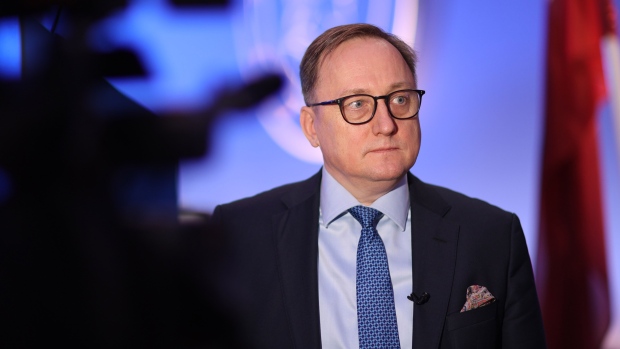Apr 19, 2024
ECB’s Kazaks Says It’s Too Soon to Declare Inflation Victory
, Bloomberg News

(Bloomberg) -- It’s still too early to declare that euro-area inflation has been vanquished, even if the European Central Bank is on track to deliver a first interest-rate cut in June, Governing Council member Martins Kazaks said.
The risk of stickier-than-expected price growth — something the US is experiencing at the moment — “is part of the game,” the Latvian central-bank chief said in an interview in Washington, where he’s attending the International Monetary Fund and World Bank spring meetings.
“That’s the reason I’m not saying we’ve turned the corner,” Kazaks said. “One has to remain cautious, because it would be very tricky to start hiking rates in the middle of the cycle.”
Inflation in the euro area recently slowed to 2.4%, though price growth in the services sector has been stuck at twice the 2% goal for months. Preliminary data meanwhile suggest that increases in workers’ pay — a key focus for policymakers — are leveling off.
That’s allowed the ECB to signal it will probably lower borrowing costs in June unless the economic outlook changes drastically in the meantime, but what happens beyond that is less clear. Kazaks urged a “consistent, data-dependent” approach to monetary easing, adding that he sees no need to “rush” down to levels where borrowing costs stop holding back activity.
“Yes, the economy is not strong, but it seems that confidence is improving,” he said. “We are not in a crisis mode.”
President Christine Lagarde has said Europe is “clearly seeing signs of recovery” after more than a year of near stagnation. Output in the 20-nation bloc, though, remains fragile and Kazaks’s Maltese colleague, Edward Scicluna, says the rebound hinges on lower borrowing costs.
“If we don’t cut rates, and if a more restrictive monetary-policy stance in the US affects global financing conditions, this would be a double-whammy to the euro area economy,” he said in a separate interview. “Our monetary policy is very restrictive and is becoming even more restrictive in real terms with inflation going down.”
Investors are currently pricing between three and four cuts by the ECB this year — an assessment that Kazaks judged as being in line with the central bank’s own economic outlook.
Some officials worry that the ECB’s room for maneuver will be limited if the Fed has to put off cutting rates because of persistent price pressures. Austrian Governing Council member Robert Holzmann said it would be difficult stray too far from its US counterpart in such a scenario.
Kazaks acknowledged there are ties between the two economies that ECB officials need to take into account when setting policy.
“Of course we are living on the same globe,” he said. “Our economies are linked, especially the financial markets. That will have some bearing on the way we take our decisions, but our mandate is price stability for the euro area.”
(Updates with ECB’s Scicluna starting in seventh paragraph.)
©2024 Bloomberg L.P.






